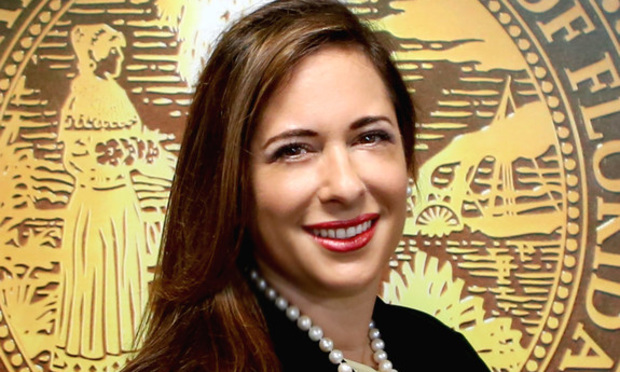Public Official Objected to His Firing Letter, But Court Found No Defamation
"It's better for the public to know what the public official is thinking without the public official having to worry about whether he's going to get sued later for something that he said," said Fort Lauderdale attorney Michael R. Piper, who defended former Sweetwater Mayor Jose M. Diaz against defamation per se allegations.
January 03, 2020 at 02:34 PM
4 minute read
 Judge Monica Gordo of Third District Court of Appeal wrote the opinion. Courtesy photo.
Judge Monica Gordo of Third District Court of Appeal wrote the opinion. Courtesy photo.
Can former Florida officials be sued for alleged defamatory statements they made while in office?
No, according to the Third District Court of Appeal, which waded into a lawsuit that asked whether a letter former Sweetwater Mayor Jose M. Diaz wrote while in office could be subject to defamation per se claims.
Fired Parks and Recreation director Luis Quintero sued Diaz in 2015, claiming that his termination letter maliciously and falsely said he had poor judgment and was "incompetent, negligent and inefficient in the performance of [his] duties."
Diaz, who's now Sweetwater's commissioner, denied acting in bad faith.
The lawsuit alleged Diaz knew that the statements in that letter — memorialized in public record — were false when he wrote them. And that, the plaintiff claimed, fell under Florida Statute Section 768.28(9)(a), which waives sovereign immunity for certain torts.
But the Third DCA disagreed, finding it didn't matter what Diaz said or didn't say within the scope of his duties: Florida's doctrine of absolute immunity protected him from legal repercussions.
"As the trial court aptly noted, Quintero's argument overlooks the well-settled fact that the defense of absolute immunity or privilege is a separate and distinct concept from sovereign immunity," the opinion said, drawing heavily from Fourth DCA case law.
Third DCA Judge Monica Gordo wrote the opinion, which drew concurrences from Chief Judge Kevin Emas and Judge Vance E. Salter.
Counsel to the plaintiff Howard Brodsky of Gerald J. Tobin P.A. in Coral Gables did not respond to a request for comment by deadline.
'We want people to serve'
The ruling held "no surprises" for Diaz's attorney, Michael R. Piper of Johnson, Anselmo, Murdoch, Burke, Piper & Hochman in Fort Lauderdale, who said his client was "always comfortable with the fact that he was doing his job and he was doing it the right way."
 Michael R. Piper of Johnson, Anselmo, Murdoch, Burke, Piper & Hochman in Fort Lauderdale. Courtesy photo.
Michael R. Piper of Johnson, Anselmo, Murdoch, Burke, Piper & Hochman in Fort Lauderdale. Courtesy photo.Piper said he agreed with the panel's findings that a plaintiff can't waive sovereign immunity for a claim that couldn't be brought against the government in the first place.
"If you could never have sued the mayor for defamation, as in this case, then the waiver of sovereign immunity statute did not then create a cause of action that didn't exist," Piper said.
Though his client has never admitted any wrongdoing, Piper stressed that the idea behind absolute immunity is that public policy should favor open responses from public officials.
"It's better for the public to know what the public official is thinking without the public official having to worry about whether he's going to get sued later for something that he said," Piper said.
In Piper's view, this opinion provided a much-needed acknowledgment of immunity.
"We're seeing in other arenas that privileges are being whittled away at, and may be discouraging people from serving, particularly in the law enforcement arena. I think that this is an important decision in that regard, because we want people to serve," Piper said. "This is just further recognition of the public policy in Florida that that's what we want, and that, every once in a while, something's going to have to give in order to get people to do things that not everybody wants to do."
Read the opinion:
More appeals:
Miami Plaintiff Wins $8 Million in Attorney Fees, Costs. Here Are the Lawyers Involved
Appellate Court Revives Claims That Pop-up Window Blocked Gym Contract's Language
This content has been archived. It is available through our partners, LexisNexis® and Bloomberg Law.
To view this content, please continue to their sites.
Not a Lexis Subscriber?
Subscribe Now
Not a Bloomberg Law Subscriber?
Subscribe Now
NOT FOR REPRINT
© 2025 ALM Global, LLC, All Rights Reserved. Request academic re-use from www.copyright.com. All other uses, submit a request to [email protected]. For more information visit Asset & Logo Licensing.
You Might Like
View All
Plaintiffs Attorneys Awarded $113K on $1 Judgment in Noise Ordinance Dispute
4 minute read
As Unpredictability Rises, Gov't Law Practices Expect Trump Bump. Especially in Florida
5 minute read

Trending Stories
Who Got The Work
J. Brugh Lower of Gibbons has entered an appearance for industrial equipment supplier Devco Corporation in a pending trademark infringement lawsuit. The suit, accusing the defendant of selling knock-off Graco products, was filed Dec. 18 in New Jersey District Court by Rivkin Radler on behalf of Graco Inc. and Graco Minnesota. The case, assigned to U.S. District Judge Zahid N. Quraishi, is 3:24-cv-11294, Graco Inc. et al v. Devco Corporation.
Who Got The Work
Rebecca Maller-Stein and Kent A. Yalowitz of Arnold & Porter Kaye Scholer have entered their appearances for Hanaco Venture Capital and its executives, Lior Prosor and David Frankel, in a pending securities lawsuit. The action, filed on Dec. 24 in New York Southern District Court by Zell, Aron & Co. on behalf of Goldeneye Advisors, accuses the defendants of negligently and fraudulently managing the plaintiff's $1 million investment. The case, assigned to U.S. District Judge Vernon S. Broderick, is 1:24-cv-09918, Goldeneye Advisors, LLC v. Hanaco Venture Capital, Ltd. et al.
Who Got The Work
Attorneys from A&O Shearman has stepped in as defense counsel for Toronto-Dominion Bank and other defendants in a pending securities class action. The suit, filed Dec. 11 in New York Southern District Court by Bleichmar Fonti & Auld, accuses the defendants of concealing the bank's 'pervasive' deficiencies in regards to its compliance with the Bank Secrecy Act and the quality of its anti-money laundering controls. The case, assigned to U.S. District Judge Arun Subramanian, is 1:24-cv-09445, Gonzalez v. The Toronto-Dominion Bank et al.
Who Got The Work
Crown Castle International, a Pennsylvania company providing shared communications infrastructure, has turned to Luke D. Wolf of Gordon Rees Scully Mansukhani to fend off a pending breach-of-contract lawsuit. The court action, filed Nov. 25 in Michigan Eastern District Court by Hooper Hathaway PC on behalf of The Town Residences LLC, accuses Crown Castle of failing to transfer approximately $30,000 in utility payments from T-Mobile in breach of a roof-top lease and assignment agreement. The case, assigned to U.S. District Judge Susan K. Declercq, is 2:24-cv-13131, The Town Residences LLC v. T-Mobile US, Inc. et al.
Who Got The Work
Wilfred P. Coronato and Daniel M. Schwartz of McCarter & English have stepped in as defense counsel to Electrolux Home Products Inc. in a pending product liability lawsuit. The court action, filed Nov. 26 in New York Eastern District Court by Poulos Lopiccolo PC and Nagel Rice LLP on behalf of David Stern, alleges that the defendant's refrigerators’ drawers and shelving repeatedly break and fall apart within months after purchase. The case, assigned to U.S. District Judge Joan M. Azrack, is 2:24-cv-08204, Stern v. Electrolux Home Products, Inc.
Featured Firms
Law Offices of Gary Martin Hays & Associates, P.C.
(470) 294-1674
Law Offices of Mark E. Salomone
(857) 444-6468
Smith & Hassler
(713) 739-1250






